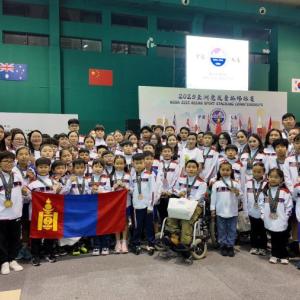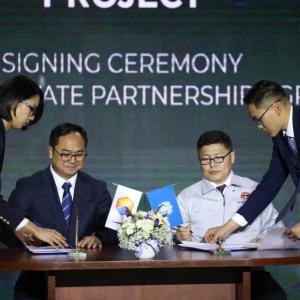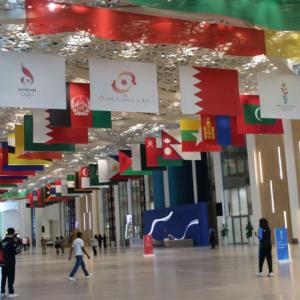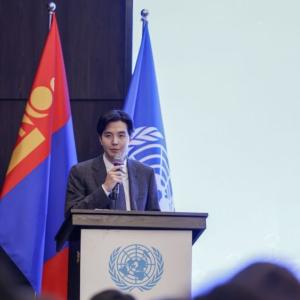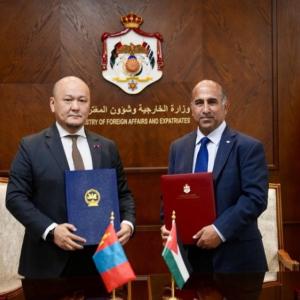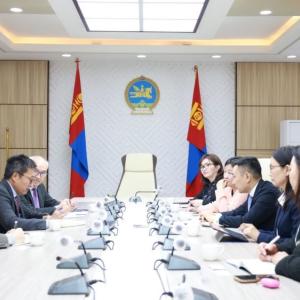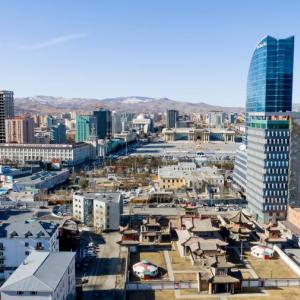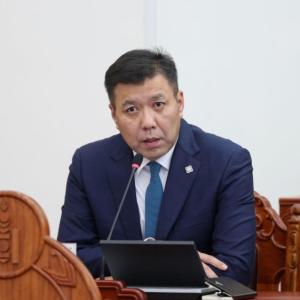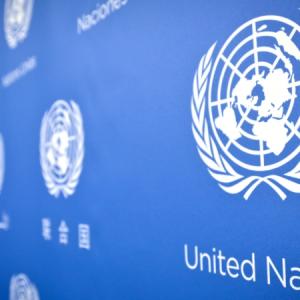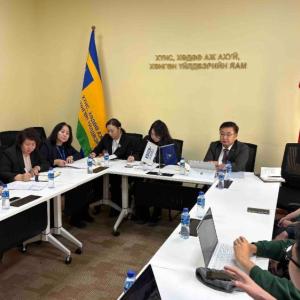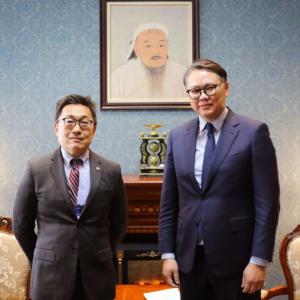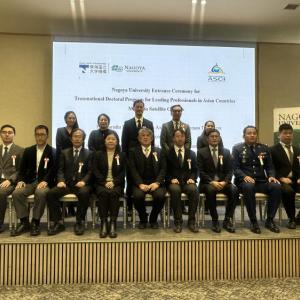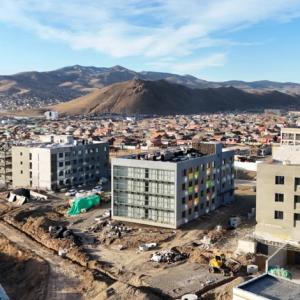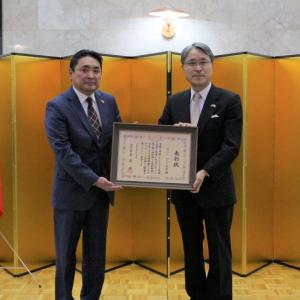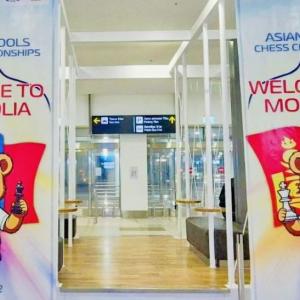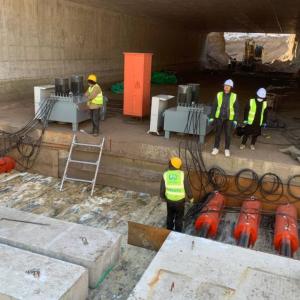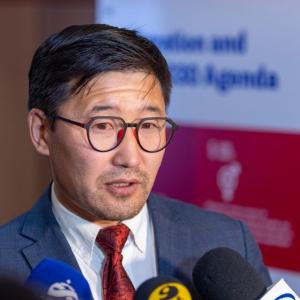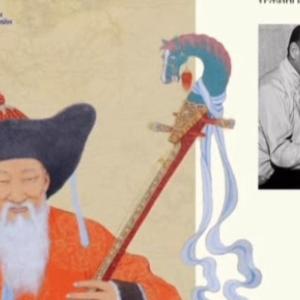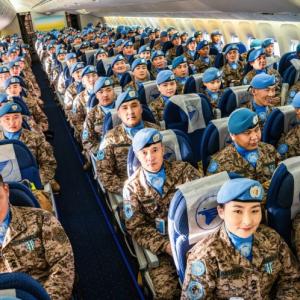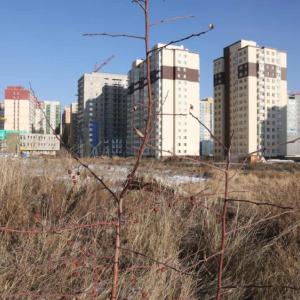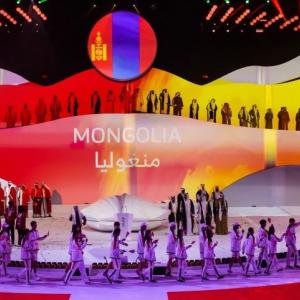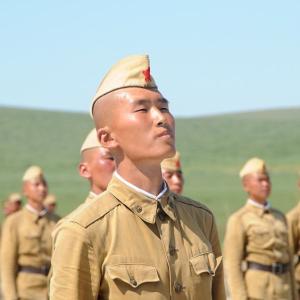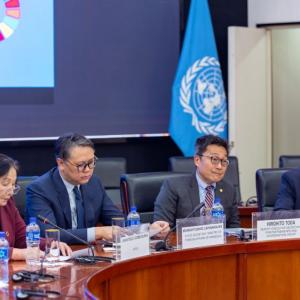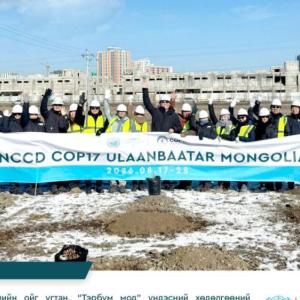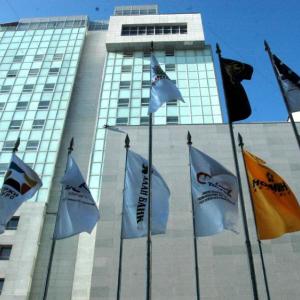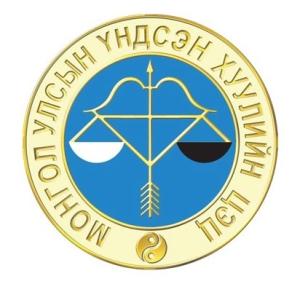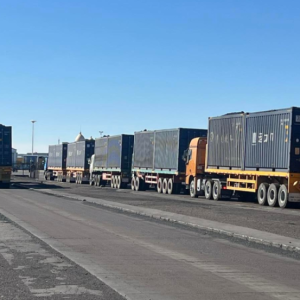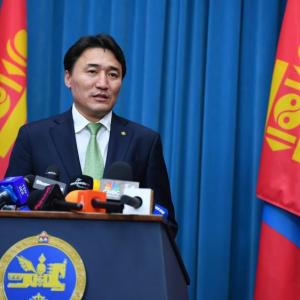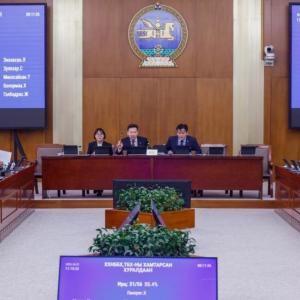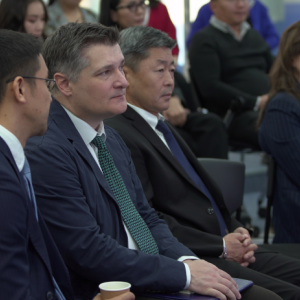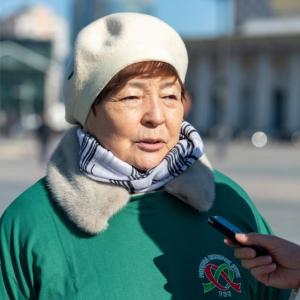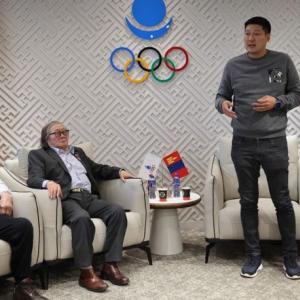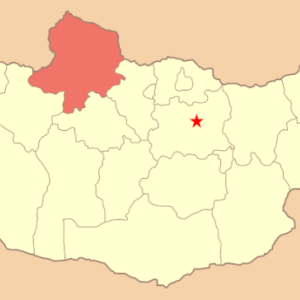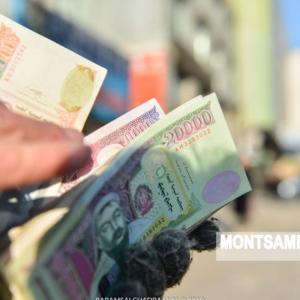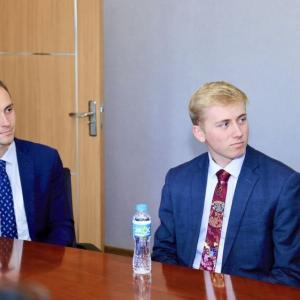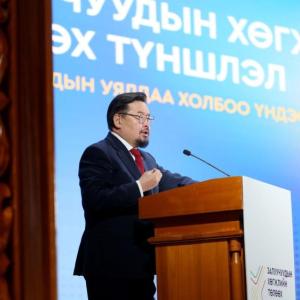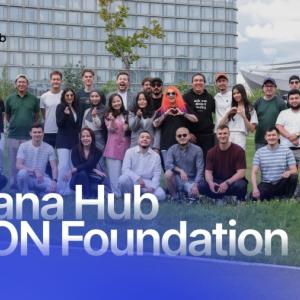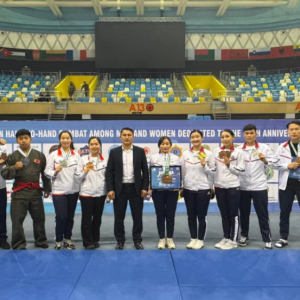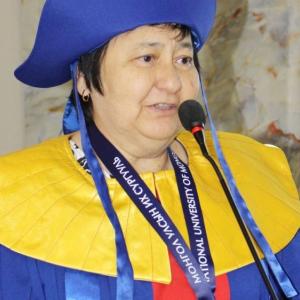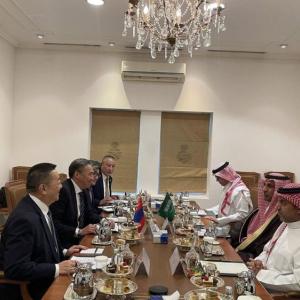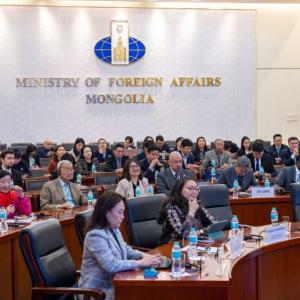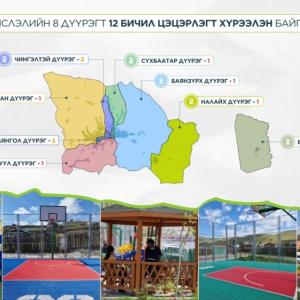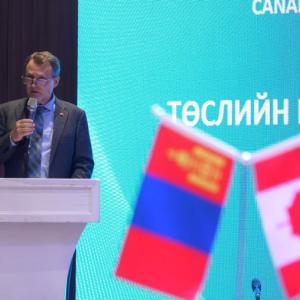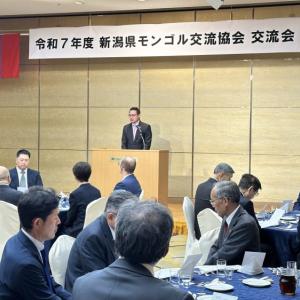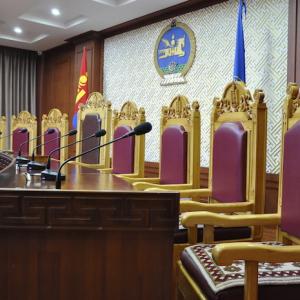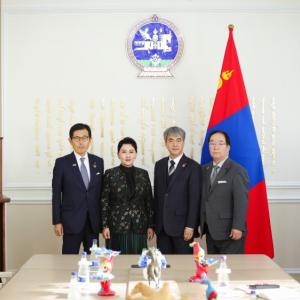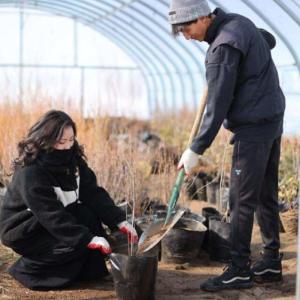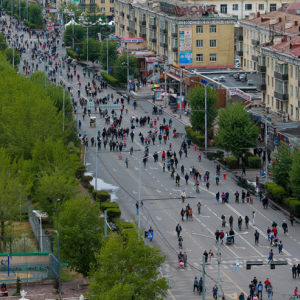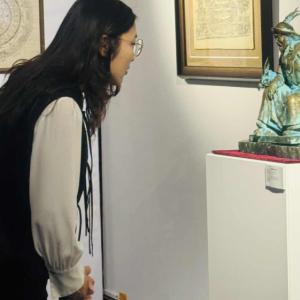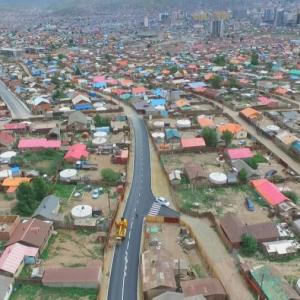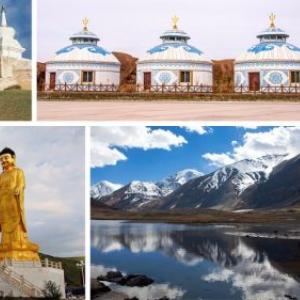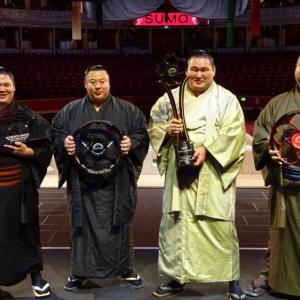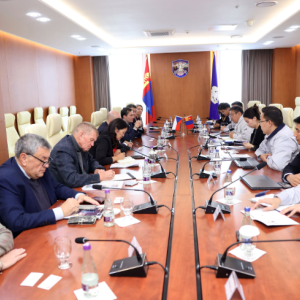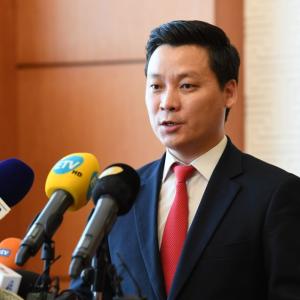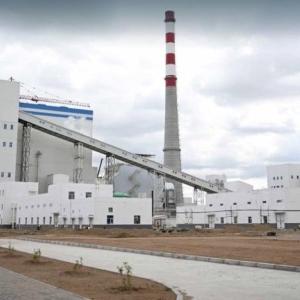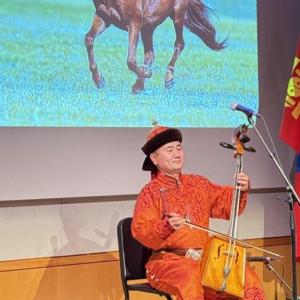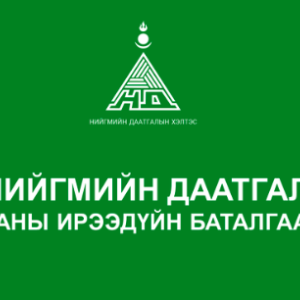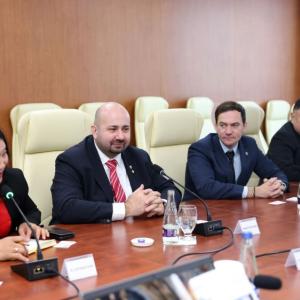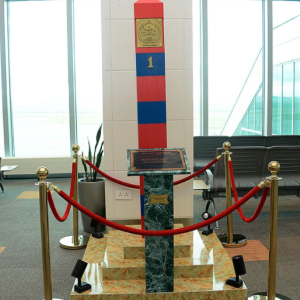Strengthening Human Resources of the Civil Service
The Mongol Messenger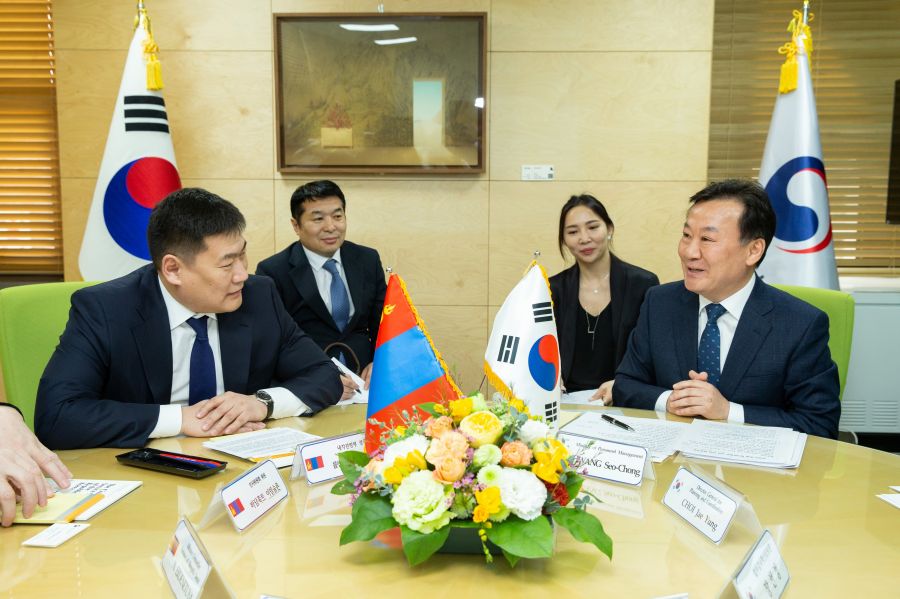
Mongolia is implementing Civil service
law from the beginning of this year. Experiences of the other countries with
advanced Civil service is exampling for us. The Cabinet Secretariat of Mongolia
and the Ministry of Personnel Management of the Republic of Korea signed a
Memorandum of Understanding on March 14, 2019. The parties will cooperate on policy
planning and implementation of innovation in the field of public human resource
management including recruitment, performance, and compensation; public policy
on human resource development to strengthen meritocracy and professionalism of civil
servants; promoting diversity in public service; information systems for public
personnel administration; Senior Civil Service system; ethics and discipline in
the civil service from 2019-2021. Some activities will be carried out and
supported by the UNDP project
“Towards a Professional and Citizen centered Civil Service in Mongolia”.
Before the MoU signing ceremony, the Minister of
Mongolia, Chief Cabinet Secretary Luvsannamsrai Oyun-Erdene and Minister of
Personnel Management of the Republic of Korea Hwang Seo-chong exchanged their
views on the human resource management in the civil service.
Luvsannamsrai
Oyun-erdene: What challenges do you face in the personnel management of the
civil service? What are the key issues to be addressed over the next 3 years?
Hwang Seo-chong: The most critical
issue at stake for public personnel management in Korea is to promote civil
servants to engage in ‘proactive public service’.
The Korean society is challenged by ever-increasing
global competition and demographic changes driven by aging population. In order
for Korea to continue its growth and development under these unfavorable
conditions, it is essential for the government to provide necessary regulatory
reforms and proactive field response.
Hence, we seek to promote a public service
culture in which civil servants will actively perform their duties and take
self-initiatives to abolish unnecessary regulations and mundane practices. By
punishing civil servants for non-initiating and low risk-taking behaviors that
puts citizens at inconveniences, and by providing civil servants taking
proactive and self-initiating behaviors with rewards and incentives, our
government is committed to fostering a public service culture for ‘proactive governance’.
Moreover, in order to adequately cope
with changes in administrative environment, our Ministry is preparing a policy
innovation which aims to reform human resource (HR) policies overarching the
entire public service life-cycle from the entry into public service, employment
period and to the retirement. This means that we will overhaul HR policies that
are outdated and fall behind current policy and socioeconomic environment. We
will create a virtuous cycle of public service HR management where high caliber
talents 1) enter civil service through a fair recruitment system, 2) continue
capacity building and accrue professional expertise and get rewarded for their
skills and performance, and 3) contribute their know-hows and expertise
attained from years of public service to the society after retirement.
Luvsannamsrai
Oyun-erdene: How does Korean government deal with ‘poor performance, non-initiating,
low risk-taking, hanging around with low productivity but without any mistakes’
civil servants? What kind of incentives do you provide for proactive public
service?
Hwang Seo-chong: When civil servants due
to lack of initiation or unwillingness to perform their duty cause violation of
rights and interests of citizens and/or damage to national finances, we call it
‘passive public service’. These passive (non-initiating, low risk-taking)
behaviors of civil servants are considered barriers to citizen-centered public
services by delaying administrative process. Passive behaviors may be a
temporary solution for an official faced with a challenge, but in the long run,
it can lead to public distrust towards government and widen the gap between the
laws and the reality.
In order to deal with civil servants
demonstrating passive behaviors in performing duty, our Ministry has devised a
scheme to punish such behaviors via disciplinary actions or warnings depending
on the severity of the issue and the manner in which it was handled. To stop
passive behaviors and instead disseminate proactive public service practices,
we are trying to come up with more fundamental solutions to improve public
service culture through training and education and communications.
We also introduced an incentive system
to provide tangible motivation for civil servants to engage in proactive public
service. For example, each government ministry will be mandated to periodically
select and reward outstanding civil servants demonstrating proactive public
service. Rewards will be provided in various forms including, but not limited
to, special promotions, overseas training opportunities, and transfers to
desired department. With incentives that appropriately reward and recognize
civil servants for proactive public service, we can reinstate and strengthen
their commitment to public service and promote a public service culture for
proactive behaviors.
Luvsannamsrai Oyun-erdene: The new Civil Service Law considers the person’s ability
to manage, analyze, problem-solving, leadership, and teamwork in recruitment.
This is a change in the principle by discarding the previous system that
examined one’s ability to memorize – legal knowledge. However, we still lack
the know-how of examining these skills. How has the Korean civil service
examinations evolved over the years, and what insights can you provide to shed
light to updating the civil service examinations in Mongolia?
Hwang Seo-chong: In 1963 when the State Public
Officials Act was amended, the Korean government introduced a merit-principle
for appointment of civil servants and selection through the open competitive
recruitment examinations. The open competitive recruitment examinations are
administered separately for grades 5, 7 and 9 (grade 5 is manager-level, grade
9 is lowest staff-level) every year and are open to every citizen regardless of
age, gender, education or work experience. The exams consist of written tests
and interviews. The written tests cover
both general subjects and specialization subjects, and subjects have been continuously
updated over the years. The interviews are intended to test candidate’s
knowledge, attitude and communication skills. With structured questions and
trained interviewers, we ensure objectivity and fairness in the interviewing
process.
Besides
the open competitive recruitment examination which does not pose any
restrictions on qualifications, we also administer competitive examinations for
experienced professionals possessing certain academic backgrounds,
certifications/licenses, and professional experiences.
As I
understand the Mongolian government is making wide ranging initiatives to
reform the recruitment system, I would like to stress the importance of 1) determining
job descriptions at organization, division, job grade, and/or position-level, and
2) establishing a sound system for ensuring civil servants possess the
professional capacity to perform their duties and for testing such capacities.
The Korean government continues its work and research in this area to modernize
our recruitment system.
Luvsannamsrai
Oyun-erdene: What are some publicly-raised concerns when the government tries
to reform the civil service recruitment system? How do you gain public trust on
civil service recruitment system?
Hwang Seo-chong: The two-pillars of government
recruitment are instilling merit-principle and ensuring fairness. Especially,
in Korea, where competition for passing the recruitment examination is fierce,
it is crucial for government to provide a fair recruitment process where
everyone is given equal chance to compete with their aptitude. Our Ministry has
adopted a ‘background blind system’ in which candidate background information
(i.e. hometown, family relations, and educational background) is completely
omitted in the recruitment process.
In
order to attain public trust and acceptance towards changes being made to
recruitment policies, when revising the test subjects of competitive
examinations, we hold roundtables, surveys and public consultation meetings to
seek comments from different stakeholders. Also, to minimize the burden on candidate
preparing for the exams in dealing with any changes, we provide adequate time
for changes to come into effect.
I
hope our past experiences relating to improving the recruitment examinations
will provide helpful insights to the Mongolian government’s efforts to reform
the recruitment system.
Luvsannamsrai
Oyun-erdene: What kind measures are in place to prevent discrimination against
certain social groups during recruitment?
Hwang Seo-chong: The merit-principle applies to civil
service recruitment and evaluations as mandated by the State Public Officials
Act. However, the government may adopt more proactive measures to ensure
diversity and gender balance in public service by giving preferential treatment
to certain socially disadvantage groups (i.e. disabled persons, low-income
class) in recruitment, promotion and transfers.
For
example, the Korean government has implemented a gender quota system since 2003
which ensures minimum percentage of either gender in open competitive
examinations for grades 5, 7 and 9. For grades 7 and 9 exams, a quota is in
place to recruit certain percentage of disabled persons. We also offer a
competitive examination for experienced professionals in which only severely
disabled persons may apply. In grade 9 exam, a quota for low-income class is
applied so that certain percentage of recruits are from low-income families.
As a
model employer, the government HR policies are quickly disseminated into
private sector in Korea. Hence, the government has adopted these diversity and
inclusion policies to prevent social discrimination and create an inclusive
society at the country-level.
Luvsannamsrai
Oyun-erdene: We are planning to develop the Civil Service Human Resource
Management System. Therefore, could you please share us with your experience on
E-Saram Electronic Personnel Management System?
Hwang Seo-chong: The Korean government introduced the
e-Saram system (electronic HRM system) in 2000 to support scientific public
personnel policies. The system has undergone phases of updates and upgrades since
its inception. Currently, 69 central government ministries/agencies with over
300,000 civil servant users are utilizing the e-Saram which provides
comprehensive public HRM features from initial employment all the way to
retirement covering appointments, remuneration and work schedules. The accrued
data and statistical information are used to inform individual
ministries/agencies in their organization-level HR policies as well as our
Ministry in our government-wide HR policies.
When
the e-Saram was first introduced in 2000, there were indeed some obstacles and
hesitations by government agencies as they were concerned about interventions
and security breaches. In order to overcome the resistance, necessary
legislations were enacted for government-wide dissemination of the standardized
HRM system. Moreover, we maintained close communication with government
organizations to inform them about the benefits of having a systematic and
secure information system for managing personnel records. These efforts were
made persistently, and eventually e-Saram was adopted across all central
government organizations.
The
e-Saram has been instrumental in building efficiency in public personnel
management functions and supporting a fair and transparent public HRM
practices. We are now at a stage of applying intelligent information technologies
to e-Saram to further support scientific public HRM policies.
Luvsannamsrai
Oyun-erdene: How does salary of civil servants compare to public sector? Do
civil servants get enough to maintain savings? How many years does it take for
civil servants to purchase an apartment?
Hwang Seo-chong: Our Ministry conducts a survey every
year to compare the remuneration of civil servants to the private sector. As of 2018, when compared to the salary-level
of administrative and managerial positions of establishments with 100 or more
full-time employees with employee composition and nature of work that are
similar to public service, the salaries of public servants are at about 85.2%
of private sector (general service 77.6%, law enforcement 89.9% and teachers
87.3%). Whether civil servants can
maintain savings accounts, or how long it takes to afford a home would largely
depend on personal situation and consumption pattern. According to the Civil
Service Census conducted in 2018, about 64.3% of civil servants were homeowners
(employed less than 5 years 19.2%, between 5-10 years 47.5%, and 10-15 years
70.1%).
Luvsannamsrai
Oyun-erdene: Are there legal grounds to protect the status of civil servants in
the event of political power shifts? If yes, what kinds of measures and how are
they observed?
Hwang Seo-chong: Except for political appointee positions, the civil
servants in Korea are ensured job security even when political leadership
changes. The Constitution of Korea provides that the career civil service in
which civil servants are employed for lifetime are protected under a fair
personnel system. In line with the Constitution, the State Public Officials Act
stipulates on job security of civil servants and shields them from endangering
their jobs. The appointment of civil servants shall be based on objective factors
such as exam scores and job performance.
The job security of
civil servants are ensured as civil servants must be apolitical and
non-partisan, and must serve duty in benefit of all citizens. The legal
framework guiding job security and political neutrality of civil servants allow
them to provide high quality and consistent public service to the citizens.
Luvsannamsrai
Oyun-erdene: Is fractionalization an issue in Korea? Do Korean civil servants
tend to support political party activity, action plan and concepts by personal
faith or belief?
Hwang Seo-chong: As
mentioned above, the Constitution and laws of Korea provides job security and political
neutrality of civil servants. Moreover, the State Public Officials Act
stipulates that civil servants are forbidden from involvement in organization
of or joining political parties or groups, publicly expressing support or
opposition for a party or candidate in an election. These measures are in place
to ensure public service does not intervene in political affairs and civil
servants serve the entire body of citizens rather than in the interest of a
political party, and ultimately protect professionalism, continuity and
stability of public administration.
Luvsannamsrai
Oyun-erdene: I have heard that a civil servant is prohibited from working in
the same field for a certain period of time after retirement. Would you
elaborate on the policy background and status of its implementation?
Hwang Seo-chong: In
keeping with the public ethics and anti-corruption movement around 1960-70s
among leading nations (i.e. Enactment of the Ethics in Government Act (1978) in the United States), the Public
Service Ethics Act was enacted in Korea in 1981 to prevent corruption in public
service and to ensure fairness in public administration process. The Act
contains provisions on asset declaration and restrictions on employment and
activities of retired public officials. With the inauguration of the Republic
of Korean government in 1948, the government bureaucracy was at the backbone of
rapid economic development of Korea. However, this also led to widespread
private-to-public corruption. With the democratic movement of 1987, the public
demands for transparency and integrity in government began to sprout, and the
Public Service Ethics Act underwent repeated amendment for stronger ethics
policy.
Currently, the Korean public officials who retire from
grade 4 or higher positions are prohibited, in principle, from being employed
by a private company, law firm or tax accounting firm that have affiliation to
the nature of job carried out during the recent five years prior to retirement.
The Public Ethics Committee conducts a thorough employment screening and over
the past 5 years, 18% of applicants have been denied of post-retirement
employment cases. Our Ministry continues to make improvements to the Public
Service Ethics Act with firm belief that government can only succeed with
strong public ethics.
Luvsannamsrai
Oyun-erdene: Can you explain about the appeals and complaint resolution concerning
government officials? Do you provide specific training in this area?
Hwang Seo-chong: The
appeals system in Korea is a special administrative appeals system for civil
servants who makes appeals to disciplinary actions and other
appointment-related actions. It is a direct measure for ensuring the job
security of civil servants and an indirect measure for self-controlling public
administration system. As stipulated in the State Public Officials Act, the
Appeals Commission is established under the Ministry of Personnel Management as
an independent and consensual body in which its appeals process is protected
from any intervention.
The grievance review system allows civil servants to file
complaints regarding work conditions, personnel management and other HR affairs
and seek resolutions. It protects the rights of civil servants in a wide range
of aspects and effectively resolves cases in which civil servants are treated
unfairly or require improved working conditions thereby enhancing efficacy of
civil servants.
In order to enhance understanding of the appeals and
grievance systems, the government offers workshops and training programs for
individuals handling appeals grievances in each government ministry/agency.
Business process manual and case studies are also distributed on a regular
basis.
Luvsannamsrai
Oyun-erdene: What is the Ministry of Personnel Management's involvement in the
appointment and promotion of special duty officials (police, intelligence,
military, etc.)? How are they regulated, which law regulates those matters?
Hwang Seo-chong: Our Ministry does not handle appointment and promotion of
special service civil servants (i.e. police, fire service, teachers, military).
There are designated laws that guide hiring rules for each category of these
special service civil servants. As a
central personnel management authority of the Korean government, our Ministry
consults and reviews whether HR-related laws and regulations governing special
civil servants follow the government HR policy and principle and ensure HR
innovation is consistently implemented across both general and special
services.
Moreover, to ensure balance in
remuneration of civil servants across different occupational groups, our
Ministry sets general salary guidelines for both the general and special
services. We are continuing our contributions to keep the HR system of special
service updated and competitive.
Luvsannamsrai
Oyun-erdene: What kinds of international activities have your Ministry been
engaged in? How can those experiences contribute to cooperation with Mongolia?
Hwang Seo-chong: In order to share experiences in public sector innovation
and to provide necessary support in other government’s efforts to improve civil
service management, our Ministry has signed a Memorandum of Understanding
(Cooperation) with 12 foreign government or international organizations
including the Cabinet Secretariat of Mongolia and is pursuing various
cooperation projects. Our affiliated training institute, the National Human
Resources Development Institute (NHI), provides international training programs
for foreign officials from many different countries including Japan, Russia,
Vietnam and Colombia, to name a few. We also provide consultations on civil
service reform based on the Korean public HR policies as well as our
experiences to the foreign governments at their request, for example, to the
Uzbekistani government.
Furthermore, as the global community
emphasize the importance of public sector innovation and capacity building of
civil servants, and forums and discussions on public employment continue to
expand among international organizations (i.e. UN and OECD), our Ministry takes
an active role in various international meetings including the OECD Public
Governance Committee (PGC), Public Employment and Management Group (PEM), and
Senior Public Integrity Officials (SPIO) for development of relevant
recommendations and indicators.
I understand the revised Law of
Mongolia on Civil Service was approved in December 2017, and the government of
Mongolia is working on bylaws and procedures for effective implementation of
the revised Law. Given our Ministry’s experiences in providing consultations
and training to other countries in SE Asia and Central Asia undergoing similar
civil service reform as Mongolia, I look forward to jointly identifying and
implementing cooperation projects between Korea and Mongolia that can provide
fruitful outcomes for your civil service reform.
Luvsannamsrai
Oyun-erdene: Do you have any advice for the Mongolian government based on
Korea’s experience with HR innovation in the public service?
Hwang Seo-chong: The
unprecedented economic growth of Korea was contributed by high caliber
government officials who designed and executed national policies aligned with
the country’s strategic objectives.
With our merit-based and fair recruitment system, the
government was able to consistently bring in highly qualified talents into
public service and through continuous strengthening of their capacity and professionalism.
These elite cadre of government officials led the economic growth of the
nation. The trust in excellence of bureaucrats both in- and outside- public
service sets foundations for public support of government-initiated policies.
The capacity of civil servants are directly tied to the
competitiveness of government. The innovation of public HR policy in Korea over
the past years have been driven by fundamental goal of recruiting high quality
talents and building their capacity and professionalism. We have diversified
channels for highly qualified individuals with professional experience from the
private sector to enter public service through competitive examination for
experienced professionals and open position system (certain government
positions are designated as open positions to non-career and/or career civil
servants). Currently, about 43% of all open positions are filled by
professionals with private sector experience.
We are also moving away from traditional job rotation
practices which meant frequent job transfers for civil servants. To foster more
specialists in the government, we also designated certain positions in the
government to be specialized-track where officials stay in the position for
long-term and build expertise in the field.
Furthermore, we introduced an assessment program to ensure only those
who have the necessary skills and capacity can be appointed to senior positions
in the government.
I believe the Mongolian government, with the UNDP Project
“Towards a professional and citizen-centered Mongolia” are making essential
steps to modernize the civil service through reform of the civil service
examination, merit-based HR management system, and establishing training
requirements for HR development. With successful civil service reform, highly
capable Mongolian civil servants will serve pivotal role in the national advancement.
Luvsannamsrai
Oyun-erdene: In order for us to move forward in building a professional and
citizen-centered civil service, training of Mongolian civil servants must
precede. We hope our officials can receive training in Korea on various HR
policy areas including recruitment, performance evaluation, and dispute
resolution.
Hwang Seo-chong: I would like to emphasize that the
success of a country’s initiatives for innovation and change for national
development largely depends on its civil servants who plan and execute those
initiatives. Hence, it is critical for the civil servants to gain extensive
knowledge on public HR policies and build their capacity.
Our Ministry and
the training institute (NHI) have a long history and experiences of offering
customized training to foreign officials. As of 2018, over 5,000 foreign
officials from 147 different countries attended training at the NHI.
I sincerely hope that the Korean government’s experiences and know-hows will be helpful to the Mongolia’s development efforts, and look forward to collaborating with the Mongolian government and UNDP in the coming years.
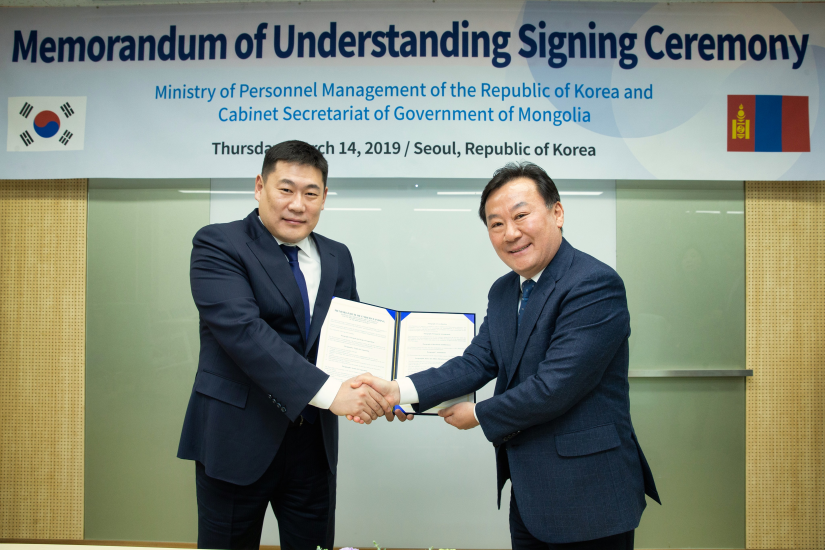
 Ulaanbaatar
Ulaanbaatar





